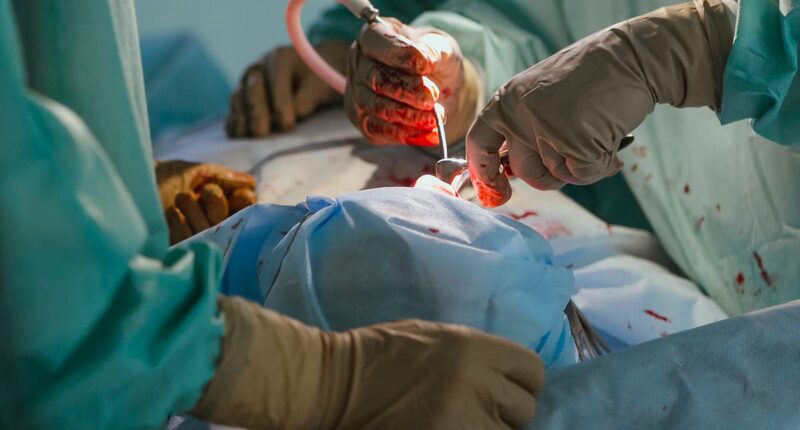Share this @internewscast.com
Organ harvesting has surged across Canada, fueled by controversial assisted suicides offered to people battling depression, not terminal illness.
In 2016, Canada approved Medical Assistance in Dying (MAiD), enabling healthcare providers to either give a lethal injection or prescribe medication for patients who meet certain criteria to end their lives.
Those who opt for MAiD can also agree to donate their organs after death, voluntarily giving them to patients in need of a transplant.
Currently, even Canadians who aren’t facing terminal illness can access this program, including those with autoimmune diseases, diabetes, or chronic pain who might otherwise live many more years with appropriate treatment.
The contentious policy has been postponed until March 2024 due to intense debates, suggesting that it might exploit vulnerable people by encouraging them to donate organs to others considered more deserving.
‘Will they acknowledge that depression needs treatment and offer people hope for a better life instead of ending their lives?’ Conservative Leader Pierre Poilievre mentioned to CBC at the time.
Despite the controversy, Canada’s euthanasia program has emerged as a global leader in organ donation, with 15,280 deaths from doctor-assisted suicide noted in 2023, a 15 percent increase from the previous year.
Many of these patients weren’t even dying, and records suggest that up to 25 percent of Ontario MAiD providers may have skirted the criminal code.

Organ harvesting has notably increased across Canada, driven by the debatable practice of offering assisted deaths to those dealing with depression rather than terminal illnesses (stock photo).

The controversial policy was delayed until March 2024 amid fierce arguments that it could be exploiting the most vulnerable, pressuring them to give up their organs to others deemed more deserving (pictured: Robert Fuller assisted suicide)

Canada’s euthanasia program has since become a ‘world leader’ in organ harvesting, with 15,280 doctor-assisted suicide deaths reported in 2023 – a 15 percent jump on the previous year
In June 2023, 37-year-old Kathrin Mentler turned to Vancouver General Hospital’s Access and Assessment Centre for help – hoping for safety from the suicidal thoughts haunting her mind, as reported by The Christian Institute.
She told hospital staff she was spiraling into crisis, desperately fighting the urge to overdose on medication and begging for help to stay alive.
During her assessment, Mentler was told there were ‘no beds’ for her and that she would have to endure a lengthy wait just to see a doctor as an outpatient.
Minutes later, Mentler said that a clinician asked if she had thought about the country’s MAiD program – selling it as ‘relief’ after the recent death of another patient battling mental illness and suicidal ideation.
‘That made me feel like my life was worthless or a problem that could be solved if I chose MAiD,’ Mentler told the outlet.
‘I live with chronic suicidal thoughts but that doesn’t mean I never feel joy in my life,’ she added.
The Vancouver hospital later apologized for ‘any distress caused’ by the doctor’s suggestion, but said it was intended only to assess whether Mentler was at risk of self-harm.
‘MAiD for mental health is not legal yet, so giving someone specifics of the process seems wrong,’ Mentler told the outlet at the time. ‘How can this be standard procedure for suicide crisis intervention?’

In June 2023, 37-year-old Kathrin Mentler turned to a Vancouver hospital for help with suicidal thoughts, but was instead asked if she had considered the country’s MAiD program (stock photo)

Amir Farsoud (pictured), a disabled Canadian man, was prepared to be euthanized in November 2022 because he said he couldn’t bear having to choose between homelessness and death
Amir Farsoud, a disabled Canadian man, was prepared to be euthanized in November 2022 because he said he couldn’t bear having to choose between homelessness and death.
He revealed how easily he was deemed eligible for the program, despite only considering euthanasia because of his desperate housing situation.
After the rooming house he lived in was listed for sale, Farsoud said he was out of options – left choosing between ‘miraculously finding a place,’ taking his own life, or applying for MAiD.
‘I did tell my doctor right off the bat that while I qualify for medical reasons, the reason I’m asking is my socio economic position at the moment,’ he told BBC in May 2024.
The doctor swiftly approved Amir for MAiD under the grounds of ‘unbearable suffering’ – clearing the way for him to be euthanized after a 90‑day assessment and waiting period.
But Farsoud’s story soon made headlines across Canada, and a GoFundMe campaign set up by a stranger raised more than $60,000 – enough to secure him new housing and ultimately change his mind about ending his life.
Farsoud called it ‘horrible’ and ‘backwards’ that people like him were driven to consider death simply because the country’s social system had failed them.
‘I think it’s horrible, whether it’s ethical or not, but I think it’s backwards,’ Farsoud told the outlet.

Farsoud (pictured) revealed how easily he was deemed eligible for the program, despite only considering euthanasia because of his desperate housing situation

In 2024, a desperate Canadian father pleaded with a judge to stop his 27-year-old daughter’s assisted suicide, insisting she wasn’t eligible due to her autism and severe mental health struggles (stock photo)

Hours before death, donors are brought to the hospital, prepped with a central venous line and heparin to preserve their organs, injected with a lethal cocktail, declared dead and immediately rushed into surgery
‘I think in a country such as ours, people shouldn’t be hungry and shouldn’t be worried about whether there’s a roof over their head,’ he added.
In 2024, a desperate Canadian father pleaded with a judge to stop his 27-year-old daughter’s assisted suicide, insisting she wasn’t eligible due to her autism and severe mental health struggles.
The daughter also suffers from attention deficit hyperactivity disorder, according to the father, who said that euthanasia was not the answer to her problems.
Her request for assisted suicide, made in 2023, had been approved by three medical professionals.
The father’s lawyer, Sarah Miller, said there were ‘genuine concerns with respect to impartiality,’ and that the young woman had been swayed into making her life-ending decision.
‘There’s no evidence before this court that she has an irremediable condition,’ Miller wrote.
Even doctors who back MAiD have warned it’s risky, admitting it very well may put ‘societal pressure’ on the community’s most vulnerable.
Hours before death, donors are brought to the hospital, prepped with a central venous line and heparin to preserve their organs, injected with a lethal cocktail, declared dead and immediately rushed into surgery.

Canada ‘s assisted suicide laws have only continued to rapidly expand in recent years, with a group of doctors pushing for disabled newborn babies to be euthanized (stock photo)

Louis Roy (pictured) raised the notion of euthanasia for babies up to a year old ‘who are born with severe deformations and very grave and severe medical syndromes’
Ethicist Wesley J. Smith labeled the process a ‘bitter irony,’ while exposing its details in a Belgian medical journal, according to Slay News.
‘Ponder the enormity of what was done here,’ Smith wrote. ‘Four people – who were not otherwise dying – were killed and then swiftly wheeled into a surgery suite to have their organs removed.’
‘Three of the donors were struggling with neuromuscular disabilities – people who often face social isolation and discrimination – and one was mentally ill,’ she added.
‘In a particularly bitter irony, the latter patient was a chronic self-harmer, the “treatment” for which was a willing professional team ready to administer the ultimate harm.’
Canada’s assisted suicide laws have only continued to rapidly expand in recent years, with a group of doctors pushing for disabled newborn babies to be euthanized.
In 2022, the Quebec College of Physicians began suggesting legalizing euthanasia for infants born severely ill.
Louis Roy, of the college, raised the notion of euthanasia for babies up to a year old ‘who are born with severe deformations, very grave and severe medical syndromes, whose life expectancy and level of suffering are such that it would make sense to ensure that they do not suffer.’
While parents already have the option of stopping treatment for babies suffering from medical conditions, the proposal would accelerate the infant’s death, sparking questions about consent.

MAiD now accounts for 4.6 percent of all fatalities – making it the most common cause of death after cancer, heart disease and accidental injuries

Just one doctor – Vancouver’s Ellen Wiebe (pictured), who used to be an abortion provider – has euthanized more than 430 patients in nine years

Other jurisdictions, including a growing number of US states, also allow doctor-assisted suicide (pictured)
MAiD now accounts for 4.6 percent of all fatalities – making it the most common cause of death after cancer, heart disease and accidental injuries.
Just one doctor – Vancouver’s Ellen Wiebe, who used to be an abortion provider – has euthanized more than 430 patients in nine years.
Stefanie Green, another Vancouver doctor, said she calls her MAID deaths ‘deliveries’ instead of ‘provisions,’ which is the term for euthanasia that Canadian doctors use.
As a former maternity doctor, she used to welcome lives into the world, and now sees her job as ‘delivering life out.’
Euthanasia is legal in seven countries – Belgium, Canada, Colombia, Luxembourg, Netherlands, New Zealand and Spain – plus several states in Australia.
Other jurisdictions, including a growing number of US states, also allow doctor-assisted suicide.
In Canada, both options are referred to as MAiD, though more than 99.9 percent of such procedures are carried out by a doctor. The number of MAiD deaths in Canada has risen steadily by about a third each year.








